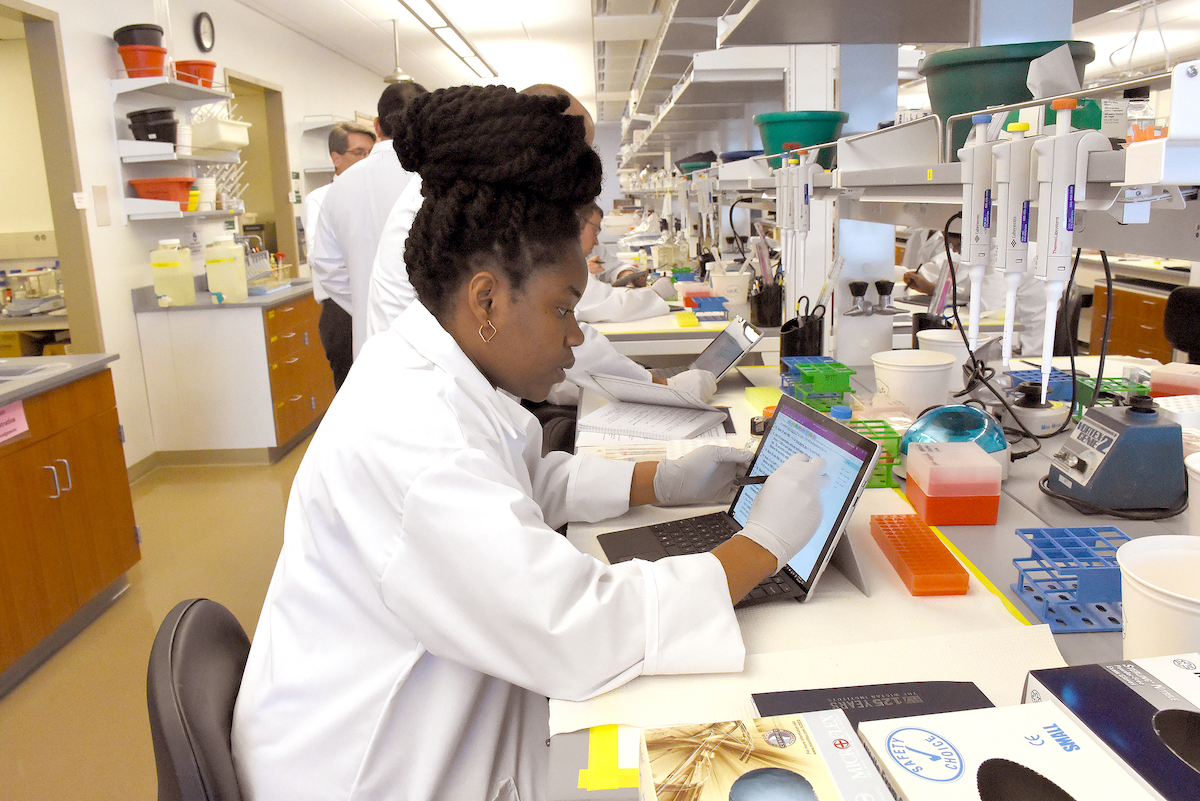As Philadelphia’s life sciences sector booms, the Wistar Institute in University City was chosen as one of seven institutions across the country to receive part of a $2 million federal fund to support STEM training.
The funding, announced by the US Economic Development Administration on Thursday, is part of President Joe Biden’s American Rescue Plan aimed at economic recovery amid the COVID-19 pandemic. The EDA announced last year that it had earmarked $2 million to support programs that train STEM talent in their region in a program called the STEM Talent Challenge.
The challenge specifically looked for nonprofits, states, cities, counties, higher ed institutions, federal labs or science parks, or economic development orgs that would fuel workforce development for much-needed science skills. Wistar, which specializes in early-stage discovery science in the areas of cancer, immunology and infectious disease, already has ongoing training programs, like its 20-year-old Biomedical Technician Training Program.
Through the STEM Talent Challenge, Wistar was awarded nearly $250,000 to develop the Quality Science Pathway Apprenticeship, a partnership with Pathway for Patient Health. The funding will be matched by a local donor.
The apprenticeship program will train people for life-sustaining jobs — that is, jobs that offer long-term possibility, a high pay rate, benefits and opportunity for growth — in quality sciences, measuring products or practices to ensure they’re free of defects or deficiencies. Such skills are among the “greatest workforce needs” of Philadelphia’s burgeoning life sciences sector, said Dr. David Zuzga, Wistar’s associate dean of biomedical studies and principal investigator on the grant, at a press conference.
“Despite this workforce need, there’s few, if any, workforce training programs in quality sciences,” Zuzga said. “Our partner, Pathway for Patient Health’s chief quality officers have created a curriculum to reduce on-boarding with new employees. It is uniquely valuable skills that will be directly related to their first position. This is a win-win that is creating a local, highly specific workforce.”
Alejandra Castillo, the assistant secretary of commerce for economic development, called the rise of life sciences industry in the Philadelphia region “critical to human health.”
“Its key to developing the next generation of science leaders,” she said of the new programing.
Mayor Jim Kenney noted that the “booming” life science and innovation ecosystem in Philly was creating an increased demand for lab technician positions and other biomedical expertise. The rise in demand and increase of jobs in the region provide an “enormous opportunity toward recovery” from the pandemic, he said.
Kenney added that he appreciated the EDA’s focus on equity within the STEM Talent Challenge, and said Philadelphia’s existing and to-be-created job training programs must bring underrepresented people into the fold of the growing life sciences industry.
Other projects supported by the STEM Talent Challenge are a VR STEM workforce program in Phoenix; the LabCentral Ignite Career Forge program in Cambridge, Massachusetts; Project OCTEIN in Omaha, Nebraska; an overhaul of Purdue Polytechnic Anderson’s bachelor’s degree curriculum into micro-credentialing and job placement programs; The Women in Geospatial Careers program in St. Louis; the The Magic City Data Collective project in Birmingham; and a manufacturing, renewable energy, and electric vehicle project in Logan, Utah. Read more about the individual programs here.
Before you go...
Please consider supporting Technical.ly to keep our independent journalism strong. Unlike most business-focused media outlets, we don’t have a paywall. Instead, we count on your personal and organizational support.
Join our growing Slack community
Join 5,000 tech professionals and entrepreneurs in our community Slack today!

Entrepreneurship is changing, and so is the economic development behind it

Tech Hubs’ new $210M funding leaves Baltimore and Philly off the table

Here’s what to know before using AI to craft your brand’s social media posts


